(完整版)历年英语中考考点归纳
中考英语教材考点梳理(知识点大全)一本通 九全 Unit 1-2

九年级全册 Units 1~2【常考词汇】1.put on【知识点睛】put on 意为“增加(体重),发胖;穿上,戴上”。
My grandfather put on his weight after he retired.我爷爷在退休后发福了。
He put on his hat and went out.他戴上帽子出去了。
We're going to put on a funny play at the party.我们打算在聚会上演一个滑稽剧。
【同步拓展】①put away:把....收起来放好②put back:放回③put down:放下④put into:放入⑤put off:推迟⑥put out:扑灭,熄灭⑦put up:张贴,举起⑧put sth.to good use:充分利用2.warn【知识点睛】warn 动词,意为“警告;告诫”,常用于以下结构中:warn sb.about/of sth.警告/提醒某人某事 warn sb.not to do sth.警告某人不要做某事 warn sb.against (doing)sth.警告某人不要做某事 I warnedthem of danger.我提醒他们有危险。
The teacher warned her not to be late again.老师警告她不要再迟到了。
He warned me against walking alone at night.他告诫我夜间不要单独行走。
【即时演练】1)The policeman __A__ the driver not to drive at high speed any more.A.hoped B.minded C.warned D.made3.patient adj.有耐心的n. 病人【知识点睛】 (1)patient 用作名词时,意为“病人”,是可数名词。
He is examining a patient. 他正在诊断病人。
广州历年英语中考考点归纳
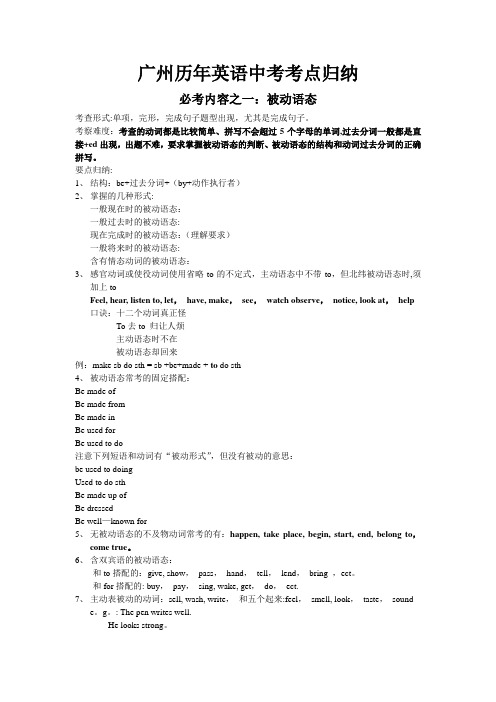
广州历年英语中考考点归纳必考内容之一:被动语态考查形式:单项,完形,完成句子题型出现,尤其是完成句子。
考察难度:考查的动词都是比较简单、拼写不会超过5个字母的单词,过去分词一般都是直接+ed出现,出题不难,要求掌握被动语态的判断、被动语态的结构和动词过去分词的正确拼写。
要点归纳:1、结构:be+过去分词+(by+动作执行者)2、掌握的几种形式:一般现在时的被动语态:一般过去时的被动语态:现在完成时的被动语态:(理解要求)一般将来时的被动语态:含有情态动词的被动语态:3、感官动词或使役动词使用省略to的不定式,主动语态中不带to,但北纬被动语态时,须加上toFeel, hear, listen to, let,have, make,see,watch observe,notice, look at,help 口诀:十二个动词真正怪To去to 归让人烦主动语态时不在被动语态却回来例:make sb do sth = sb +be+made + to do sth4、被动语态常考的固定搭配:Be made ofBe made fromBe made inBe used forBe used to do注意下列短语和动词有“被动形式”,但没有被动的意思:be used to doingUsed to do sthBe made up ofBe dressedBe well—known for5、无被动语态的不及物动词常考的有:happen, take place, begin, start, end, belong to,come true。
6、含双宾语的被动语态:和to搭配的:give, show,pass,hand,tell,lend,bring ,ect。
和for搭配的: buy,pay,sing, wake, get,do,ect.7、主动表被动的动词:sell, wash, write,和五个起来:feel,smell, look,taste,sounde。
初中英语中考知识点总结归纳完整版
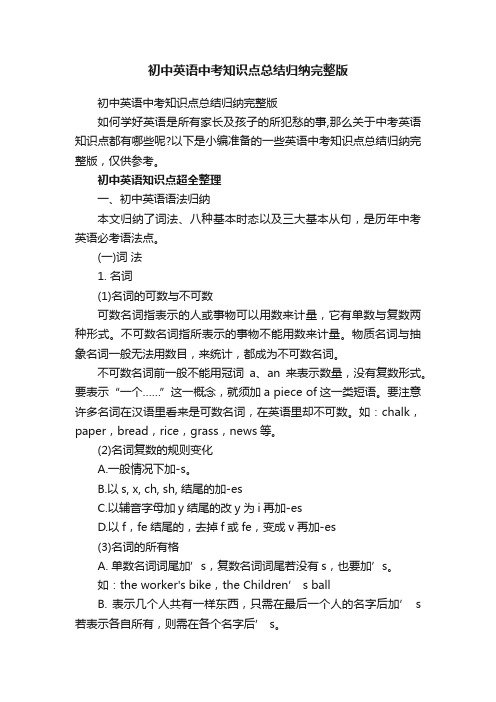
初中英语中考知识点总结归纳完整版初中英语中考知识点总结归纳完整版如何学好英语是所有家长及孩子的所犯愁的事,那么关于中考英语知识点都有哪些呢?以下是小编准备的一些英语中考知识点总结归纳完整版,仅供参考。
初中英语知识点超全整理一、初中英语语法归纳本文归纳了词法、八种基本时态以及三大基本从句,是历年中考英语必考语法点。
(一)词法1. 名词(1)名词的可数与不可数可数名词指表示的人或事物可以用数来计量,它有单数与复数两种形式。
不可数名词指所表示的事物不能用数来计量。
物质名词与抽象名词一般无法用数目,来统计,都成为不可数名词。
不可数名词前一般不能用冠词a、an来表示数量,没有复数形式。
要表示“一个……”这一概念,就须加a piece of这一类短语。
要注意许多名词在汉语里看来是可数名词,在英语里却不可数。
如:chalk,paper,bread,rice,grass,news等。
(2)名词复数的规则变化A.一般情况下加-s。
B.以s, x, ch, sh, 结尾的加-esC.以辅音字母加y结尾的改y为i再加-esD.以f,fe结尾的,去掉f或fe,变成v再加-es(3)名词的所有格A. 单数名词词尾加’s,复数名词词尾若没有s,也要加’s。
如:the worker's bike,the Children’ s ballB. 表示几个人共有一样东西,只需在最后一个人的名字后加’ s 若表示各自所有,则需在各个名字后’ s。
如:This is Lucy and Licy’ s room.These are Kate's and jack’ s rooms.C. 如果是通过在词尾加—s构成的复数形式的名词,只加’。
如:the students’ books,the girls’ blouses(另外:名词+of+名词名词是有生命的,我们就用’s结构来表示所有关系。
如果名词所表示的事物是无生命的,我们就要用名词+of+名词的结构来表示所有关系。
(整理)中考英语语法考点
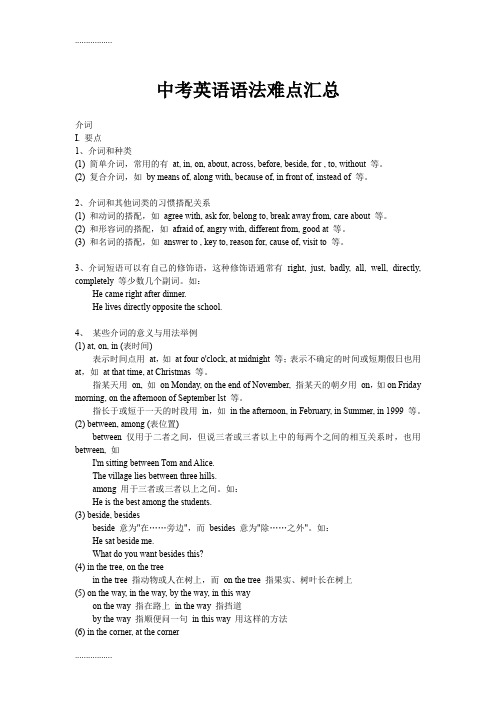
中考英语语法难点汇总介词I. 要点1、介词和种类(1) 简单介词,常用的有at, in, on, about, across, before, beside, for , to, without 等。
(2) 复合介词,如by means of, along with, because of, in front of, instead of 等。
2、介词和其他词类的习惯搭配关系(1) 和动词的搭配,如agree with, ask for, belong to, break away from, care about 等。
(2) 和形容词的搭配,如afraid of, angry with, different from, good at 等。
(3) 和名词的搭配,如answer to , key to, reason for, cause of, visit to 等。
3、介词短语可以有自己的修饰语,这种修饰语通常有right, just, badly, all, well, directly, completely 等少数几个副词。
如:He came right after dinner.He lives directly opposite the school.4、某些介词的意义与用法举例(1) at, on, in (表时间)表示时间点用at,如at four o'clock, at midnight 等;表示不确定的时间或短期假日也用at,如at that time, at Christmas 等。
指某天用on, 如on Monday, on the end of November, 指某天的朝夕用on,如on Friday morning, on the afternoon of September lst 等。
指长于或短于一天的时段用in,如in the afternoon, in February, in Summer, in 1999 等。
完整版)中考英语常考的动词短语归纳
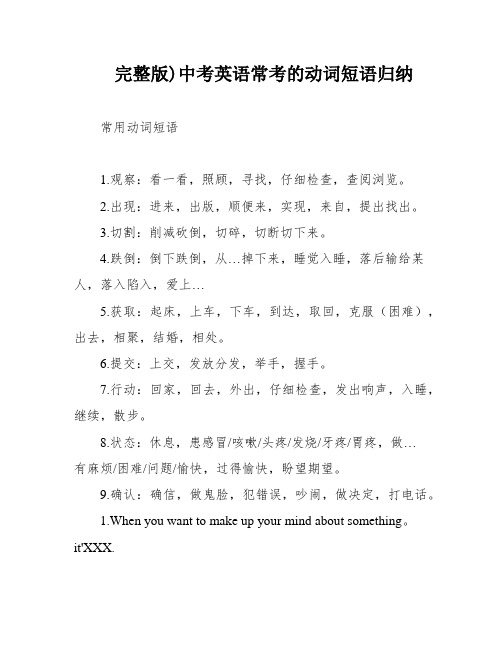
完整版)中考英语常考的动词短语归纳常用动词短语1.观察:看一看,照顾,寻找,仔细检查,查阅浏览。
2.出现:进来,出版,顺便来,实现,来自,提出找出。
3.切割:削减砍倒,切碎,切断切下来。
4.跌倒:倒下跌倒,从…掉下来,睡觉入睡,落后输给某人,落入陷入,爱上…5.获取:起床,上车,下车,到达,取回,克服(困难),出去,相聚,结婚,相处。
6.提交:上交,发放分发,举手,握手。
7.行动:回家,回去,外出,仔细检查,发出响声,入睡,继续,散步。
8.状态:休息,患感冒/咳嗽/头疼/发烧/牙疼/胃疼,做…有麻烦/困难/问题/愉快,过得愉快,盼望期望。
9.确认:确信,做鬼脸,犯错误,吵闹,做决定,打电话。
1.When you want to make up your mind about something。
it'XXX.2.Making friends with new people can be a great way to expand your social circle and learn new things.3.We set off on our journey early in the morning。
XXX.4.It takes a lot of hard work and XXX.5.Before we set out on our hike。
we made XXX.6.Whenever you do something。
it's important to do your best and give it your all.7.XXX.8.Some people naturally do well in sports。
while others excel in academics or the arts.9.Doing the chores may not be the most exciting task。
中考英语-介词-超全考点梳理+易错点拨

中考英语-介词-超全考点梳理+易错点拨一、表示时间的介词1. in,on,at,overat用于表示时刻、时间的某一点at lunch在午饭时at breakfast早餐时at noon正午时at night在夜间at that time那时at the moment此刻,目前at the same time同时at times偶尔,有时at nine在九点钟at first开始的时候,起初at last最后►We usually have lunch at noon/ at twelve. 我们通常中午吃午饭(十二点吃午饭)。
注意:表示时间的名词前有this, last, next, every等修饰时,其前面不加介词。
this morning今天早上last Monday上周一every week每周on用于表示某天,某一天的上、下午(指具体的某一时,一律用on)on Monday 在周一on Monday evening 在周一晚上on Tuesday morning 在周二早上on June 6在6月6日on May 4,2016 在2016年5月4日on a cold night在一个寒冷的夜晚on that day在那天on Christmas Day在圣诞节那天on time准时on the night of July(the)first 在七月一日的夜晚►We didn’t listen to the lecture on Wednesday afternoon. 周三下午我们没去听演讲。
in用于表示周、月、季节、年和泛指的上午、下午、晚上(指在一段时间内)。
in the week在这周in the holiday在假期中in May 在五月in 1995在1995年in summer在夏季in Spring在春季in autumn在秋季in winter在冬季in September, 1995 在1995年9月in the morning 在上午in the afternoon 在下午in the evening在晚上in the 21st century在二十一世纪in time及时in an hour一个小时后in a minute一会儿,立刻►The plane took off on time.飞机准时起飞了。
最新中考英语总复习资料总汇(完整版)
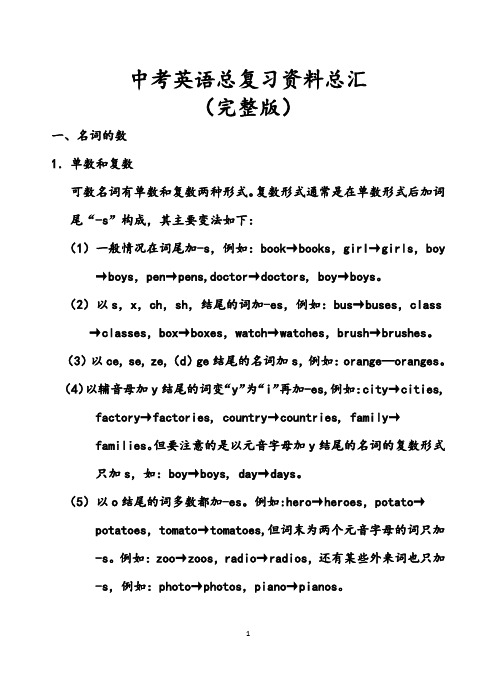
中考英语总复习资料总汇(完整版)一、名词的数1.单数和复数可数名词有单数和复数两种形式。
复数形式通常是在单数形式后加词尾“-s”构成,其主要变法如下:(1)一般情况在词尾加-s,例如:book→books,girl→girls,boy →boys,pen→pens,doctor→doctors, boy→boys。
(2)以s,x,ch,sh,结尾的词加-es,例如:bus→buses,class →classes,box→boxes,watch→watches,brush→brushes。
(3)以ce, se, ze,(d)ge结尾的名词加s,例如:orange—oranges。
(4)以辅音母加y结尾的词变“y”为“i”再加-es,例如:city→cities, factory→factories, country→countries, family→families。
但要注意的是以元音字母加y结尾的名词的复数形式只加s,如:boy→boys, day→days。
(5)以o结尾的词多数都加-es。
例如:hero→heroes,potato→potatoes,tomato→tomatoes,但词末为两个元音字母的词只加-s。
例如:zoo→zoos,radio→radios,还有某些外来词也只加-s,例如:photo→photos,piano→pianos。
(6)以f或fe结尾的词,多数变f为v再加-es,例如:knife→knives,leaf→leaves, half→halves。
复数词尾s(或es)的读音方法如下表所示。
复数词尾s(或es)的读音方法(7)少数名词有不规则的复数形式,例如:man→men,woman→women,tooth→teeth,foot→feet,child→children,mouse→mice。
【注意】与man和woman构成的合成词,其复数形式也是-men和-women。
中考英语语法知识点归纳(1)
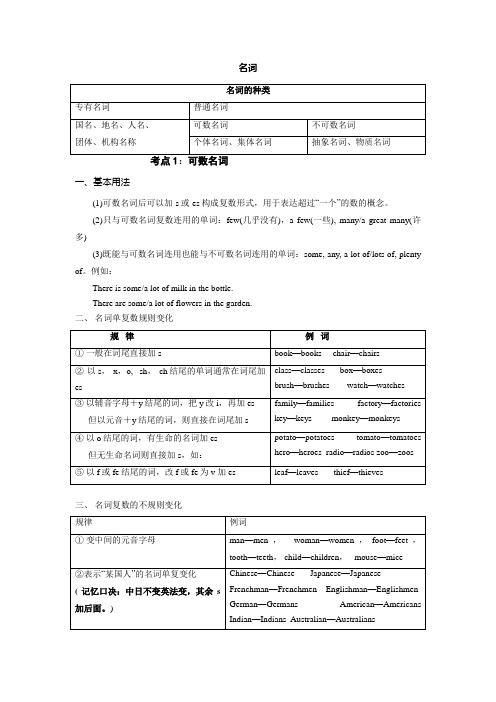
名词一、基本用法(1)可数名词后可以加-s或-es构成复数形式,用于表达超过“一个”的数的概念。
(2)只与可数名词复数连用的单词:few(几乎没有),a few(一些), many/a great many(许多)(3)既能与可数名词连用也能与不可数名词连用的单词:some, any, a lot of/lots of, plenty of。
例如:There is some/a lot of milk in the bottle.There are some/a lot of flowers in the garden.二、名词单复数规则变化三、名词复数的不规则变化一、基本用法(1) 不可数名词没有复数形式,不能与a/an或具体数字连用,但特指某物时可以与定冠词the连用。
(2) 要表示一定的数量时,常与a cup of, a bottle of, a piece of 等量词连用,如a cup of tea一杯茶; two bottles of water两瓶水注意:区别two boxes of chalk与two boxes of apples。
(3) 只能修饰不可数名词的词有:a little(一点),little(几乎没有),much/a great deal of(许多)(4) 常考的不可数名词有:food, drink (饮料), orange(橙汁), milk, rice, bread, meat(肉), chicken(鸡肉), pork(猪肉), beef(牛肉),work, homework, news(新闻) advice(建议), information(信息), weather(天气), Chinese(汉语), knowledge(知考点3:名词所有格在英语中,有生命的名词及表示时间、距离、国家、城市的名词,常在词尾加’s 表示所属关系,叫做名词的所有格。
翻译成:“的”。
初中英语中考考点大汇总
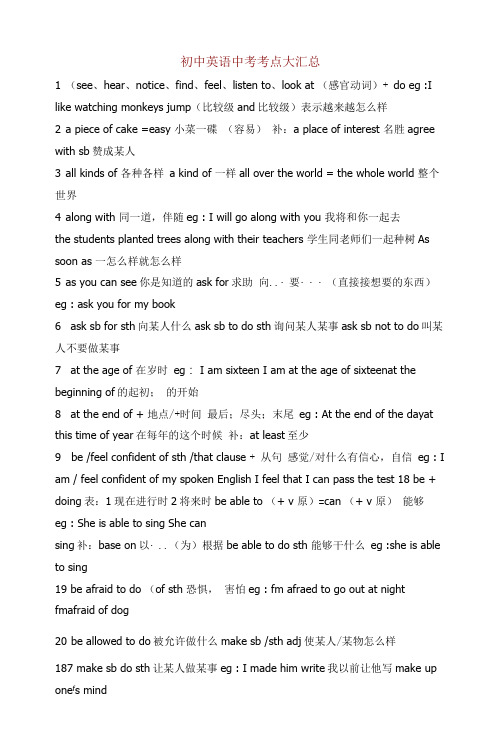
初中英语中考考点大汇总1(see、hear、notice、find、feel、listen to、look at (感官动词)+ do eg :I like watching monkeys jump(比较级and比较级)表示越来越怎么样2a piece of cake =easy 小菜一碟(容易)补:a place of interest 名胜agree with sb赞成某人3all kinds of 各种各样a kind of 一样all over the world = the whole world 整个世界4along with 同一道,伴随eg : I will go along with you 我将和你一起去the students planted trees along with their teachers 学生同老师们一起种树As soon as 一怎么样就怎么样5as you can see你是知道的ask for求助向..・要・・・(直接接想要的东西)eg : ask you for my book6ask sb for sth向某人什么ask sb to do sth询问某人某事ask sb not to do叫某人不要做某事7at the age of 在岁时eg: I am sixteen I am at the age of sixteenat the beginning of的起初;的开始8at the end of + 地点/+时间最后;尽头;末尾eg : At the end of the dayat this time of year在每年的这个时候补:at least至少9be /feel confident of sth /that clause + 从句感觉/对什么有信心,自信eg : I am / feel confident of my spoken English I feel that I can pass the test 18 be + doing表:1现在进行时2将来时be able to (+ v 原)=can (+ v 原)能够eg : She is able to sing She cansing补:base on以・..(为)根据be able to do sth 能够干什么eg :she is able to sing19be afraid to do (of sth 恐惧,害怕eg : fm afraed to go out at night fmafraid of dog20be allowed to do被允许做什么make sb /sth adj使某人/某物怎么样187make sb do sth让某人做某事eg : I made him write我以前让他写make up one f s mind188make...difference to...189mind sb to do mind one's doing 介意做什么most 十名most of + 代190much too + 形容词must be 一定191need +名词need sb do sth需要某人做某事192need to do (实义动词)need do (情态动词)no /neithr of hate to do no /neithr of hate doing193no +名词not anymore = no more 再也不eg: He didn't cry any more He cried nomore他再也不哭not...(形、副)at all eg: He's not tall at all she doesn't junp far at all194not...at all 一点都不not only... but also...不但…而且…not...either 表否定,也不eg : I don't japanse either I don't have sister; either我也没有姐姐195not...until 直到才eg: I didn't sleep until my mother came back The child didn't stop crying until I give her sugar196offer / provide sb with sth 给某人提供offer sb sth ( offer sth to sb 提供什么东西给某人eg : I offer you water (I offer water to you我给你提供水197on one's way to...在谁去那的路上on the one hand 一方面on the other hand 另一方面198on the phone = over the phone 用电话交谈on time 准时in time 及时199one day =some day = someday 一天,有一天one of +可数名词的复数形式200one to another 一个到另一个over and over agin 一遍又一遍的eg : He cleaned the floor over and over agin201part-time job 兼职工作fall-time job 全职工作pay for...付......钱pay the bill 开钱,付钱202please +do pull...up from...把..・从・..拉上来please help yourself203pleased with sbpool into = pore into204practice +doing 练习做某事prefer sth to sth 相对更喜欢eg : I preferphysics to chemisty 在物理和化学中,我更喜欢物理prefer doing to sth更喜欢去做..,不愿意去做.・・eg: He prefers riding a bike todiving他更喜欢骑自行车,不开小车prefer to do sth rather than do sth 宁愿做…也不愿eg: My unde prefers to buy a now car rather than repaiv the used one 我叔叔更喜欢买新的车,也不去修旧车prefer sb not to do sth 更愿意...eg: I prefer her not to come 我不喜欢她不来205pretend to do sth 装着去做什么pretend that 从句eg : The two cheats pretended to be working very hard 这两个骗子装着努力工作He pretended that he did not know the answer 他装着不知道答案rather...than 宁可也不eg : I would rather be a doctor than a teacher 我愿肯当医生,也不当老师He likes dogs rather than cats 他喜欢狗,不喜欢猫225 regard...as 把当作eg: Please give my best regards to your family请带我向你的家人我最好的问候I regard you as my friend我把你当作我的朋友He shows little regard for others 他不爱关心别人226 remid sb about sth提醒某人什么事remid sb to do sth提醒某人做某事eg : he remids me about cooking (he remids me to cook 他提醒我做饭227 remid sb of sth使某人想起什么eg : the pictures remind me of my school days 这照片使我想起了我的学校the words that (which) the teacher talke to remind me of my mother228 return sth to sb还什么东西给某人229 say to oneself 对自己说230 say to sb对某人说231 sb spend somemoney on sth 花了多少钱在某事上232 sb spend sometime with sb 花了多少时间陪谁233 sb spend sometime(in) doing sth 花了多少时间做某事234 sb with sb +is sband sb +are235 see sb do看见某人做过某事see sb doing看见某人正在做某事236 seem to do/be +adj 显得怎么样eg : You seem to be tired You seem to be happy it seem that237 send +sb sth送给某人某物238 send…to…把什么寄到哪里去?239 shock 使震惊eg : Oh , IVs only you ! You give me a shock 啊,是你呀!吓我一跳show sb sth 向某人展示某物 eg : I show her the book.240show sb sth = show sth to sb 拿什么东西给某人看eg: Show me your pen Show your pen to meshow sth to sb 向某人展示某物eg : I show the book to her.241some...others... 一些另一些start...with...从开始begin...with...从开始242stay away from 远离start doing sth/start to dosth 开始做某事eg : We1 re told to stay away from the animals whe visiting the zoo 当我们参观zoo时、我们要远离动物If you want to lose weight you'd better stay auay from the sweet food 徒工你想减肥,你最好远离甜食stop doing停下正在做的事243stop sb from doing sth阻止某人做某事stop sb(from) doing阻止某人做某事244stop to do停下正在做的事去做下一件事such +名这样,这种245suit sb适合某人surprise sb 使某人惊奇to one's surprise 令某人惊奇246take classes 上课take one's temperature 给某人量体温take sb to 把某人带去eg : I take you to the hospital247take walks = take a walk = go for a walk 散步①talk to 对谁说eg : I talk to you ② talk with 和谁说eg : I talk with him③ talk of 谈到eg : we talked of you ④ talk about 谈论关于257 talk with sb和某人说话258 teach sb sth教某人做某事tell sb do sth告诉某人做某事259tell sb sth tell sb that 丛句tell sb not to do sth tell a storytell sb sth告诉某人某事260tell sb to do sth告诉某人做什么tell sb not to do sth告诉某人不要做什么tell...from... thank to 幸亏,由于261thank you for +doing thank sb for sth 因某事而感谢某人the same + 名词(doing)+asthe more... the more...越..,就越..・262the same...(名)...as as...(adj adv)...as 相同the way to do sth=the way of doing sth 做某方面的方法the day before yesterday前天the way to +地方去哪的路e g : Do you know the way to learn EnglishDo you know the way of learning English263the way to…(地点)到哪的路269 too...to...太怎样而不能adj +enough to 足够..・能・・.so...that +丛句太… 所以…(such+名词…that+从句)eg: He is too young to go to school = He is so young that he cant go to school He is old enough to go to school = He is so old that he can go to school270 transalteinto 把什么翻译成什么eg : Trasalte English into Chinese271 travel with sb和某人去旅游272 try one's best to do sth尽某人最大的努力去做某事eg: I w川try my best to learn English well273 try to do sth想干什么,但没成功try doing sth想干什么,已经做过了eg : He tried to climb他想爬上去,但没成功He tried climbing他想爬上去,已经做过了274 try…试衣服have a try试一下275 turn down 开小 <—turn up 开大276 turn off 关上—turn on 打开open 拆开277 upside down 但J着nuless=if not278 visit to...参观某个地方279 wait for sb 等某人280 wait for sb to do sth 等某人做什么wait for sb 等某人wait for sometime 等多少间eg : Would you please wait for me to get ready 等我准备好,好吗?Let's wait for the rain to stop 让我们等雨停吧281 wake sb up把某人叫醒282 want to do sth想做某事283 watch sb do sth观看某人做某事补:wear out把…穿坏284 welcome to +…(地方)欢迎到285 what about +n /doing eg : what about an apple286 what if如果怎么办What if +句子eg : What if it is true ?如果是真的怎么办?What if aliens should come to the earth假如外星人来到地球怎么办?287 what they will do = what to do288 What's the matter ? = WhaVs the trouble ? = Whafs wrong ?有什么困难?289 while +延续性动词290 why don't you do = why not do291 will you please do will you please not do292 with one's best = with the help of sb 在某人的帮助下293 with the help of sb 在某人的帮助下with one f s help294 work at…在某处工作295 work with sb和某人一起工作296 would like sth /to do sth eg : I would like to go to LuZhou297 would you please +do 298 yet :至今,用在否定句中299 you'd better do最好做某事=you'd better not do最好不要做某事300不定式+v(原)301联系动词(taste吃起来/sound听起来/look看起来/semll闻起来)+adj302名词、副词、形容词修饰enongh时,形容词放在之前,名词副词放在之后303太多too much +不可数too many +可数much too相当于very ,修饰形容词304向宾语提问:Whom 305向地点提问:Where 306向方式提问:How307向价格和不可数名词提问:How much 308向可数名词提问:How many309向频率提问:How often 310向时间段提问:How long311向时间提问:what time/when 312向物主代词提问:Whose313向职业提问:what do/does……do 314向主语提问:Who315在将来时中,……以后(用in, 一般时态中,……以后(用after316.It's time for sth.该到做某事的时间了 . It's time to do sth.(Its time for sb. todo sth)该到(某人)做某事的时间了.317.can't wait to do sth.迫不及待地要求做某事.318.ask (tell)sb. (not )to do sth .请(告诉)某人(不)做某事.319.make/let sb. to do sth.让某人做某事.320.hear/see/sb. do sth听见/看见某人做某事.321.had better(not )do sth 最好不做某事.322.Its better to do sth 最好做某事It's best to do sth 最好做某事323.enjoy喜欢做某事finish结束做某事324.keep继续做某事keep on doing sth.继续做某事325.carry on继续做某事go on继续做某事326.feel like喜欢做某事stop to do sth与stop doing sth停下来去做某事(与)停止做某事.327.forget/remember to do 与forget/「emember doing sth,忘t己/,己得去做某事(与)忘记/记得曾经做过事.328.keep(precent,stop)sb. from doing sth 阻止/防止/阻栏栽人做某事prefer....to喜欢・・・,.胜过329.prefer to do sth. rather than do ath,宁愿做某事,而不原做某事.ed to do sth.过去常常做某事.331.What's wong with? .・…出了问题(事)?332.have nothing to do with.・...与...一无关be busy doing sth .在忙于做某事333.tooto.・・・・太・・・・・・以致知于不・・・・・・so ......that.....如此.....以致知于不......334.such.・・・.that如此以致知于不It take sb. some time to do sth ,某人做某事用了一些时间.335.spend .・・・,on sth.(doing sth)花钱/时间做某事.336.pay.….for sth.花费(钱)买某物.337.What /how about……?…,…怎么样(好吗)?338.would like to do sth .想要/愿意做某事..339.I don't think that 我认为不・・・,,Why not do sth.? Why don't you do sth ・为什么不做某事呢340.What do you mean by.…你.…是什么意思?341.What do you think of (How do you like .・・.)你认为・・.,怎么样?342.Mike enjoys collecting stamps . So do L迈克喜欢集邮,我也也喜欢.343.The more, the better,越多越剧好.344.Thanks for doing sth•谢谢你做了某事.345.It is said that..… 据说…356,感官动词see, watch, observe, notice, look at, hear; listen to, smell, taste, feel + do 表示动作的完整性,真实性;+doing表示动作的连续性,进行性,I saw him work in the garden yesterday,昨天我看见他在花园里干活了。
中考英语考点之时间状语从句(完整版)

中考英语考点之 时间状语从句考点三十八时间状语从句1. 引导时间状语从句的连词2. when,while,as引导时间状语从句的区别when,while,as显然都可以引导时间状语从句,但用法区别非常大。
①when可以和延续性动词连用,也可以和短暂性动词连用;而while和as只能和延续性动词连用。
Why do you want a new job when you’ve got such a good one already?你已经找到如此好的工作,为何还想再找新的?(get为短暂性动词)Sorry, I was out when you called me.对不起,你打电话时我刚好外出了。
(call为短暂性动词)Strike while the iron is hot.趁热打铁。
(is为延续性动词,表示一种持续的状态)The students took notes as they listened.学生们边听课边做笔记。
(listen为延续性动词)②when从句的谓语动词可以在主句谓语动作之前、之后或同时发生;while和as从句的谓语动作必须是和主句谓语动作同时发生。
a. 从句动作在主句动作前发生,只用when。
When he had finished his homework, he took a short rest. (finished先发生)当他完成作业后,他休息了一会儿。
When I got to the airport, the guests had left. (got to后发生)当我赶到飞机场时,客人们已经离开了。
b. 从句动作和主句动作同时发生,且从句动作为延续性动词时,when,while,as都可使用。
①When / While / As we were dancing, a stranger came in. (dance为延续性动词)当我们跳舞时,一位陌生人走了进来。
中考英语考点归纳
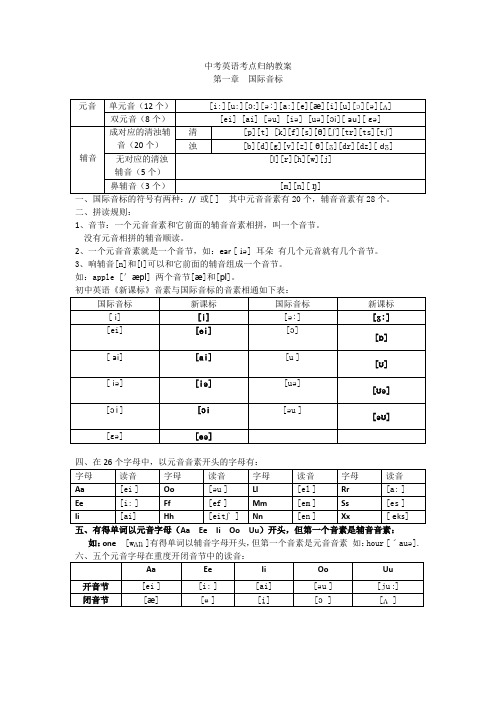
中考英语考点归纳教案 第一章 国际音标一、国际音标的符号有两种:// 或[ ] 其中元音音素有20个,辅音音素有28个。
二、拼读规则:1、音节:一个元音音素和它前面的辅音音素相拼,叫一个音节。
没有元音相拼的辅音顺读。
2、一个元音音素就是一个音节,如:ear [ i ə] 耳朵 有几个元音就有几个音节。
3、响辅音[n]和[l ]可以和它前面的辅音组成一个音节。
如:apple [′æpl ] 两个音节[æ]和[pl ]。
初中英语《新课标》音素与国际音标的音素相通如下表:四、在26个字母中,以元音音素开头的字母有:如:one [w ʌn ]有得单词以辅音字母开头,但第一个音素是元音音素 如:hour [ˊau ə]. 六、五个元音字母在重度开闭音节中的读音:第二章名词名词:表示人或者事物名称的词。
1、专有名词表示人,事物,地点,团体,机构或者国家等专有名称的词叫专有名词(包括人名称呼、地理名称、地名等)专有名词第一个字母要大写,前面一般不用冠词,但在下列两种情况下名词前要加定冠词the。
如:(1)由普通名词或形容词构成的专有名词前要加定冠词the。
the Great Wall the United States the United Nations(2) 在江河、海洋、山脉、运河、群岛、平原或者沙漠等专有名词前要用定冠词the.the Yellow River the Pacific Ocean2、普通名词:表示某一类人,某一类事物,某一种物质或抽象概念的名称。
普通名词可以分为(可数名词)和(不可数名词)。
不可数名词的四大特点:1.不可数名词前不能加“s ”。
2.不可数名词前不能加a/an.3.与不可数名词搭配的谓语动词永远用单数形式。
如:T here is some water in the bottle。
4.不可数名词要表示量的时候要用表示量的单位词。
如:a piece of bread名词的所有格:1..表示一种所属关系(1)构成:a. 单数名词结尾加“’s ”构成如:Jim’s bagb.以“s ”结尾的复数名词只加“’”. 如:the teachers’roomc. 不以“s ”结尾的复数名词加“’s ”构成. 如:Women’s Day(2) ,名词所有格主要用于表示有生命的东西的名词2.表示没有生命的东西的名词一般用“of+名词”的结构表示所属关系。
中考英语考点归纳(全)
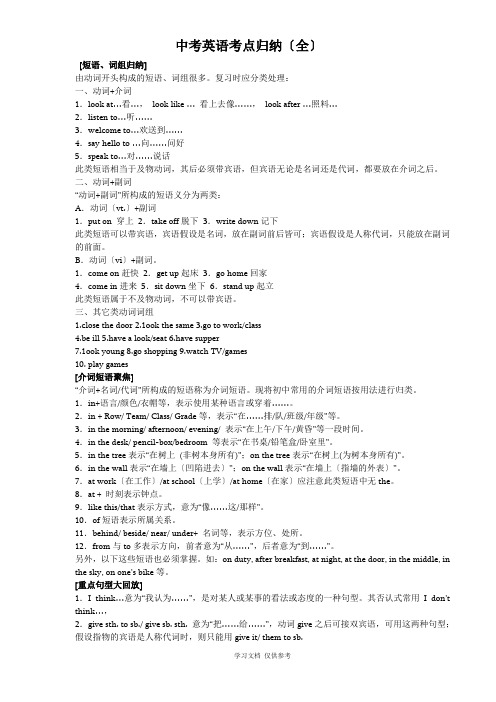
中考英语考点归纳〔全〕[短语、词组归纳]由动词开头构成的短语、词组很多。
复习时应分类处理:一、动词+介词1.look at…看…,look like … 看上去像……,look after …照料…2.listen to…听……3.welcome to…欢送到……4.say hello to …向……问好5.speak to…对……说话此类短语相当于及物动词,其后必须带宾语,但宾语无论是名词还是代词,都要放在介词之后。
二、动词+副词“动词+副词”所构成的短语义分为两类:A.动词〔vt.〕+副词1.put on 穿上2.take off脱下3.write down记下此类短语可以带宾语,宾语假设是名词,放在副词前后皆可;宾语假设是人称代词,只能放在副词的前面。
B.动词〔vi〕+副词。
1.come on赶快2.get up起床3.go home回家4.come in进来5.sit down坐下6.stand up起立此类短语属于不及物动词,不可以带宾语。
三、其它类动词词组1.close the door2.1ook the same3.go to work/class4.be ill5.have a look/seat6.have supper7.1ook young 8.go shopping 9.watch TV/games10. play games[介词短语聚焦]“介词+名词/代词”所构成的短语称为介词短语。
现将初中常用的介词短语按用法进行归类。
1.in+语言/颜色/衣帽等,表示使用某种语言或穿着……。
2.in + Row/ Team/ Class/ Grade等,表示“在……排/队/班级/年级”等。
3.in the morning/ afternoon/ evening/ 表示“在上午/下午/黄昏”等一段时间。
4.in the desk/ pencil-box/bedroom 等表示“在书桌/铅笔盒/卧室里”。
初中英语语法考点大全(中考必备)
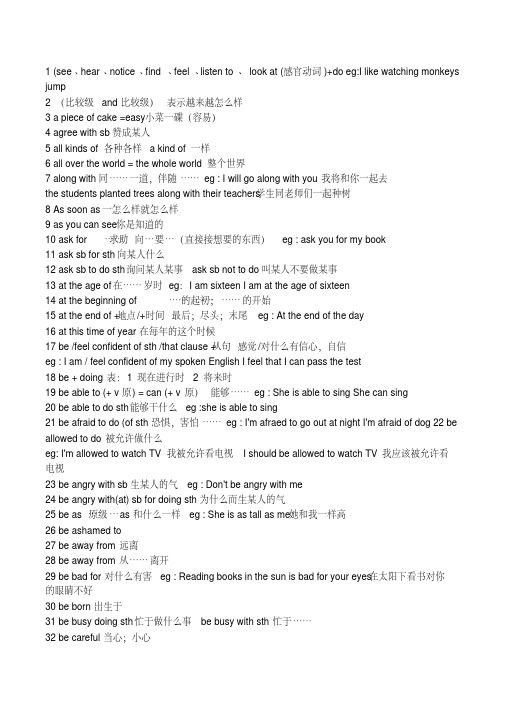
1 (see 、hear 、notice 、find 、feel 、listen to 、look at (感官动词)+do eg:I like watching monkeys jump2 (比较级and 比较级)表示越来越怎么样3 a piece of cake =easy 小菜一碟(容易)4 agree with sb 赞成某人5 all kinds of 各种各样 a kind of 一样6 all over the world = the whole world 整个世界7 along with同……一道,伴随…… eg : I will go along with you我将和你一起去the students planted trees along with their teachers 学生同老师们一起种树8 As soon as 一怎么样就怎么样9 as you can see 你是知道的求助向…要…(直接接想要的东西)eg : ask you for my book10 ask for ……11 ask sb for sth 向某人什么12 ask sb to do sth 询问某人某事ask sb not to do 叫某人不要做某事13 at the age of 在……岁时eg:I am sixteen I am at the age of sixteen的起初;……的开始14 at the beginning of …………15 at the end of +地点/+时间最后;尽头;末尾eg : At the end of the day16 at this time of year 在每年的这个时候17 be /feel confident of sth /that clause +从句感觉/对什么有信心,自信eg : I am / feel confident of my spoken English I feel that I can pass the test18 be + doing 表:1 现在进行时 2 将来时19 be able to (+ v 原) = can (+ v 原)能够…… eg : She is able to sing She can sing20 be able to do sth 能够干什么eg :she is able to sing21 be afraid to do (of sth 恐惧,害怕…… eg : I'm afraed to go out at night I'm afraid of dog 22 be allowed to do 被允许做什么eg: I'm allowed to watch TV 我被允许看电视I should be allowed to watch TV 我应该被允许看电视23 be angry with sb 生某人的气eg : Don't be angry with me24 be angry with(at) sb for doing sth 为什么而生某人的气25 be as…原级…as 和什么一样eg : She is as tall as me 她和我一样高26 be ashamed to27 be away from 远离28 be away from 从……离开29 be bad for 对什么有害eg : Reading books in the sun is bad for your eyes 在太阳下看书对你的眼睛不好30 be born 出生于31 be busy doing sth 忙于做什么事be busy with sth 忙于…… 32 be careful 当心;小心33 be different from…… 和什么不一样34 be famous for 以……著名35 be friendly to sb 对某人友好36 be from = come from 来自eg :He is from Bejing He comes from Bejing Is he from Bejing ? Does he come from Bejing ?37 be full of 装满……的be filled with 充满eg: the glass is full of water the glass is filled with water38 be glad+to+do/从句39 be going to + v(原)将来时40 be good at(+doing) = do well in 在某方面善长, 善于…… 41 be good for 对什么有好处eg : Reading aloud is good for your English42 be happy to do 很高兴做某事43 be helpful to sb 对某人有好处eg : Reading aloud is helpful to you 大声朗读对你有好处Exercising is helpful to your bady 锻炼对你的身体有好处44 be in good health 身体健康45 be in trouble 处于困难中eg : She is in trouble They are in tronble46 be interested in 对某方面感兴趣47 be late for = come late to 迟到eg: Be late for class 上课迟到48 be like 像…… eg : I'm like my mother49 be mad at 生某人的气50 be made from 由……制成(制成以后看不见原材料)51 be made of 由……制成(制成以后还看得见原材料) 52 be not sure 表不确定53 be on a visit to 参观54 be popular with sb 受某人欢迎55 be quiet 安静56 be short for 表**的缩写eg: 陶is short for 陶俊杰57 be sick in bed 生病在床58 be sorry to do sth be sorry for sb eg : I am sorry for you59 be sorry to hear that 60 be sorry to trouble sb eg : I am sorry to trouble you61 be strict in doing sth 严于做某事eg : He's strict in obeying noles62 be strict with sb 对某人要求严格eg: Some students are not strict with them selves 这些学生对自己不严格63 be strict with sb in sth 某方面对某人严格64 be supposed to do 被要求干什么65 be sure 表确定66 be sure of doing sth 对做某事有信心eg: He is sure of winning I am sure of learning English well67 be sure of sth 对做某事有信心eg: I'm sure of my head (my teacher 我相信我的大脑(老师)68 be sure that sth 对做某事有信心eg: I'm suer that he can pass the test 我相信他能通过考试69 be sure to do sth一定会做某事eg: We are sure to pass the test 我们一定会通过这次考试We are sure to learn English well 我们一定能学好英语70 be terrified of + 名/动doing 害怕…… 71 be terrified to do sth 害怕做某事72 be the same as … 和什么一样73 be used to doing sth 习惯做某事eg: My father is used to getting up early 我爸爸习惯早He is used to sleeping in class 他习惯上课睡觉74 be worth doing 值得做什么75 be(feel) afraid to do sth 害怕做某事be afraid of sth 害怕某物be afraid that 丛句76 because+句子because of +短语eg : He was late because he had a headache He was late because of his headache以什么开始什么77 begin to do = start to do 开始做某事start…with…=begin…with… eg : Let's begin the game with the song I begin to go home两者之间78 between…and… 79 borrow sth from sb 向……借…… lend sth to sb ( lend sb sth 借给……什么东西eg : I borrowed a pen from him he lent a pen to me ( he lent me a pen80 both = the same(as) = not different(from) 表相同81 bother 打扰bother sb to do stheg : I'm sorry to bother you ,but can you tell me to way to the station我十分道歉打扰你,但是你能告诉我怎么去车站the problem has been bothering me for weeks 这个问题困扰了我几个周了He's bothering me to lend him money82 by the end of 到……为止83 call sb sth eg : We call him old wang84 care 关心eg : Don't you care about this country's future ?你为什么不关心国家的未来85 catch up with sb 赶上某人86 chat with sb 和某人闲谈take sb to + 地点带某人去某地87 come in 进88 come over to 过来89 come up with 提出eg: Can you come up with a good idea 你能想出一个好办法吗?90 communicate with sb 和某人交流91 consider + doing 考虑做什么eg : Why not consider going to lu zhou 为什么不考虑去泸州?92 dance to 随着……跳舞eg : She likes dancing to the music 她喜欢随着音乐跳舞93 decide to do sth 决定做某事94 do a survey of 做某方面的调查95 do better in 在……方面做得更好96 do wrong 做错97 Don't forget to do sth 不要忘了做某事98 Don't mind +doing /从句/名词不要介意…… 99 each +名(单)每一个…eg : Each student has many books 每一个学生都有一些书100 end up +doing101 enjoy +doing喜欢102 escape from 从……逃跑eg: The prisoners have escaped from the prison犯人从监狱里逃跑出来103 expect to do sth 期待做某事104 fall down 摔下来fall off 从哪摔下来105 fall in love with sb /sth 爱上什么106 far from 离某地远eg : The school is far from my home107 find +it +adj +to do 发现做某事怎么样108 find sb/sth +adj 发现什么怎么样eg : I find the book interesting109 finish 完成+doing(名词)110 fit to sb = be fit for sb 适合某人111 forget to do 没有做而忘了forget doing 做了而又忘了eg: Don't forget to go home I forget closing door从某某到某某eg: From me for her112 from…to… 113 get /have sth down 做完,被(别人)做…eg: I have my hair cut 我理了发(头发被剪了)Tom got his bad tooth pulled out 汤母把他的坏牙拔掉了(被牙医拔掉了)114 get a part-time job= find a part-time job115 get along well with sb = get on well with sb 与某人相处得好116 get along with sb = get on with sb 与某人相处117 get ready for = be ready for为什么而准备eg : I get ready for math I am ready for math 118 get sb in to trouble 给某人麻119 get sb to do sth从某处得到某物120 get…from… 121 give a talk 做报告eg: He is give a tall122 give sth to sb give sb sth 给某人某物123 go fish 钓鱼go swimming 游泳124 go on to do 去做下一件事go on doing 继续做这件事125 go out away from go out of126 go to school 上学(用于专业的)go to the school 去学校(不一定是上学)127 good way to 好方法128 hate to do 讨厌没做过的事hate doing 讨厌做过的事129 have a party for sb 举办谁的晚会130 have a talk 听报告谈一谈131 have been doing 现在完成进行时eg : You have been talking You have been sleeping since 地方)……去过某过地方have gone to …(地方)去了某地还没回来132 have been to …(133 have fun +doing 玩得高兴134 have sth to do 有什么事要做eg: I have a lot of homework to do 我有很多家庭作业要做I have nothing to do 我没什么事情做135 have to do sth 必须做某事136 have trouble (problem) (in) doing sth 做什么事情有麻烦137 have…time +doing时间)…off 放……假eg: I have month off 我请一个月得假138 have…(139 hear sb +do/doing 听见某人做某事/正在做某事140 help a lot 很大用处141 help sb with sth \one's sth 帮助某人某事(某方面)help sb (to) do sth 帮助某人做某事142 hope to do sth 希望做某事143 How about(+doing) = What about(+doing)144 how do you like = what do you think of 你对什么的看法145 if : 是否=wethereg: I don't know if (wether) I should go to the party 我不知道我是否应该去参加晚会He don't know if (wether) we will arrive on time tomorrow morning 他不知道我们明天早上是否能准时到达146 if :如果,假如(全部接一般时态)+条件语态从句eg: I'll go to LuZhou if it does't rain 假如明天不下雨,我就去泸州If they change the plan they will let me know 假如他们要改变计划,他们会让我知道的I'll go to England ,if I have enough money next year 如果我明年由足够的钱,我就要去英国147 in one's opinion = sb think 某人认为148 in some ways 在某些方面149 in the end = finally(adv) 最后什么在什么的北方(north 北sowth 南west 西east 东)150 in the north of… 151 in the sun 在太阳下152 increase 增加eg : They've increased the prece of petrol by 3% 他们把石油价增加了3%the population has increased from 12 million ten years ago to 18 million now153 instead of +(名)代替eg: I'd like an apple instead of a pear 我想要苹果,而不要梨子I like English instead of math 我喜欢英语而不喜欢数学154 introduce sb to sb 介绍某人给某人introduce oneself 自我介绍155 invite sb to do sth 邀请某人做某事156 It takes sb sometime to do sth 做某人花掉某人多少时间eg : It took me 5 minutes to do my homework It takes me half an hour to cook157 It's +adj +for sb to do sth 对某人来说做某事怎么样158 It's +adj +to do 做某事怎么样159 It's +adj for sb 对于某人来说怎么样It's +adj of sb 对某人来说太怎么样160 It's +adj(for sb) to do(对某人来说)做某事怎么样It's +adj of sb to do sth 对某人来说做某事太怎么样eg : It's nice of you to help me with my English161 It's a good idea for sb to do sth 对…… 来说是个好主意162 It's important to sb 对某人来说很重要eg: It's important to me163 It's time to do sth It's time for sth 到了该去做某事的时间eg : It's time to have class It's time for class 该去上课了164 join = take part in 参加165 just now 刚才166 keep +sb /sth +adj /介词短语让什么保持什么样?167 keep out 不让…… 进入168 keep sb adj 让……保持…… eg: I want to keep my mother happy keep healthy 保持健康169 key to +名词表示:某物的钥匙或某题的答案可以是答题或钥匙170 key to… anser to … key取笑…… eg : Don't langh at others We langhed at the joke171 laugh at… 172 learn by oneslfe 自学173 learn from sb 向某人学习eg: We should learn from Lei Feng174 learn to do sth 学做某事175 let sb do sth 让某人做某事176 Let sb down 让某人失望eg :We shouldn't let our farents down 我们不应该让我们的父母失望177 live from :离某地远178 live in +大地方/at +小地方居住在某地eg: I live in LuZhou She lives at XuanTan179 look after = take care of 照顾照看180 lose one's way 谁迷路eg : Lose your way 你迷路181 make a decision to do sth 决定做某事182 make friends with sb 和谁成为朋友eg : I want to make friends with you183 make it early 把时间定的早一点184 make on exhibition of oneself 让某人出洋相185 make sb /n +n 使什么成为什么eg : I made her my step moller I made you my wife186 make sb /sth +adj 使某人(某物)怎么样eg : You must made your bed clean187 make sb /sth adj 使某人/某物怎么样188 make sb do sth 让某人做某事eg : I made him write 我以前让他写189 make up be made up of (被动语态)由……组成190 make…difference to… 191 mind sb to do mind one's doing 介意……做什么192 most +名most of +代193 much too +形容词194 must be 一定195 need +名词196 need sb do sth 需要某人做某事197 need to do (实义动词)need do (情态动词)198 no /neithr of hate to do no /neithr of hate doing199 no +名词200 not anymore = no more 再也不…… eg: He didn't cry any more He cried no more 他再也不哭201 not… (形、副)at all eg: He's not tall at all she doesn't junp far at all202 not…at all 一点都不203 not…either 表否定,也不eg : I don't japanse either I don't have sister, either 我也没有姐姐204 not…until 直到……才…… eg: I didn't sleep until my mother came back The child didn't stop crying until I give her sugar205 offer / provide sb with sth 给某人提供206 offer sb sth ( offer sth to sb 提供什么东西给某人eg : I offer you water (I offer water to you 我给你提供水在谁去那的路上207 on one's way to… 208 on the one hand 一方面on the other hand 另一方面209 on the phone = over the phone 用电话交谈210 on time 准时in time 及时211 one day =some day =someday 一天,有一天212 one of +可数名词的复数形式213 one to another 一个到另一个214 over and over agin 一遍又一遍的eg : He cleaned the floor over and over agin215 part-time job 兼职工作fall-time job 全职工作付……钱pay the bill 开钱,付钱216 pay for… 217 please +do218 please help yourself219 pleased with sb220 pool into = pore into221 practice +doing 练习做某事222 prefer sth to sth 相对……更喜欢…… eg : I prefer physics to chemisty 在物理和化学中,我更喜欢物理prefer doing to sth 更喜欢去做…不愿意去做… eg: He prefers riding a bike to diving 他更喜欢骑自行车,不开小车prefer to do sth rather than do sth 宁愿做…也不愿eg: My unde prefers to buy a now car rather than repaiv the used one 我叔叔更喜欢买新的车,也不去修旧车prefer sb not to do sth 更愿意… eg: I prefer her not to come 我不喜欢她不来223 pretend to do sth 装着去做什么pretend that 从句eg : The two cheats pretended to be working very hard 这两个骗子装着努力工作He pretended that he did not know the answer 他装着不知道答案宁可……也不…… 224 rather…thaneg : I would rather be a doctor than a teacher 我愿肯当医生,也不当老师He likes dogs rather than cats 他喜欢狗,不喜欢猫225 regard…as 把……当作…… eg: Please give my best regards to your family 请带我向你的家人我最好的问候I regard you as my friend 我把你当作我的朋友He shows little regard for others 他不爱关心别人226 remid sb about sth 提醒某人什么事remid sb to do sth 提醒某人做某事eg : he remids me about cooking (he remids me to cook 他提醒我做饭227 remid sb of sth 使某人想起什么eg : the pictures remind me of my school days 这照片使我想起了我的学校the words that (which) the teacher talke to remind me of my mother228 return sth to sb 还什么东西给某人229 say to oneself 对自己说230 say to sb 对某人说231 sb spend somemoney on sth 花了多少钱在某事上232 sb spend sometime with sb 花了多少时间陪谁233 sb spend sometime(in) doing sth 花了多少时间做某事234 sb with sb +is sb and sb +are235 see sb do 看见某人做过某事see sb doing 看见某人正在做某事236 seem to do/be +adj 显得怎么样eg : You seem to be tired You seem to be happy237 send +sb sth 送给某人某物238 send…to…把什么寄到哪里去?239 shock 使……震惊eg : Oh , It's only you ! You give me a shock 啊,是你呀!吓我一跳240 show sb sth 向某人展示某物eg : I show her the book.241 show sb sth = show sth to sb 拿什么东西给某人看eg: Show me your pen Show your pen to me242 show sth to sb 向某人展示某物eg : I show the book to her.一些……另一些…… 243 some…others… 从……开始从……开始begin…with… 244 start…with… 245 stay away from 远离…… 。
中考英语知识点总结归纳完整版
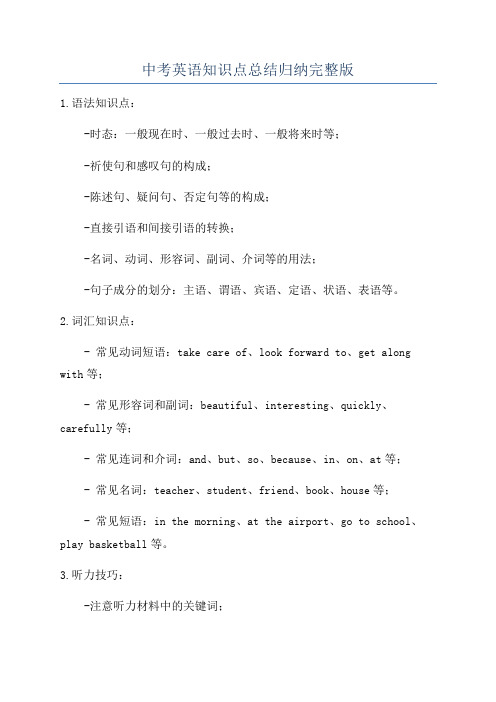
中考英语知识点总结归纳完整版1.语法知识点:-时态:一般现在时、一般过去时、一般将来时等;-祈使句和感叹句的构成;-陈述句、疑问句、否定句等的构成;-直接引语和间接引语的转换;-名词、动词、形容词、副词、介词等的用法;-句子成分的划分:主语、谓语、宾语、定语、状语、表语等。
2.词汇知识点:- 常见动词短语:take care of、look forward to、get along with等;- 常见形容词和副词:beautiful、interesting、quickly、carefully等;- 常见连词和介词:and、but、so、because、in、on、at等;- 常见名词:teacher、student、friend、book、house等;- 常见短语:in the morning、at the airport、go to school、play basketball等。
3.听力技巧:-注意听力材料中的关键词;-学会通过语境猜测单词或句子的含义;-练习听力材料,培养听力技巧;-注意听力材料中的谁在说话,对话中涉及的时间、地点、人物等信息。
4.阅读技巧:-集中注意力,全面理解文章的主旨;-注意文章的结构,抓住重点信息;-养成查字典和阅读长难句的习惯;-利用文章中的标点符号和图片等辅助理解。
5.写作技巧:-根据提纲或要求进行写作;-注意时态和语法的正确运用;-按照逻辑,合理组织文章的结构;-使用恰当的过渡词和连接词来连接句子和段落。
6.口语表达:-多进行口语练习,提高口语表达能力;-学会使用一些常用口语表达,如问候、道歉、感谢等;-注意语音语调的准确使用,避免重音和发音错误;-学会用简单明了的语言来表达自己的观点和观察。
7.语言文化:-学习英语国家的文化习俗和传统;-学习一些英语国家的历史和风景名胜;-了解英语国家的重要节日和庆祝活动;-学习英语国家的主要宗教和节日习俗。
中考英语考试涉及到的知识点比较广泛,以上总结的内容是其中的一部分。
中考英语考点(超详细),中考复习必备!.doc

中考英语考点(超详细),中考复习必备!中考英语全部考点-详细归纳专题一名词考点一:可数名词1.可数名词变化规则(1)一般情况在词尾加s。
例如:cakes cars bananas(2)以s/x/ch/sh结尾的名词加es。
例如:classes boxes matches dishs(3)以“辅音字母加y”结尾的名词,变y为i再加es。
例如:flies cities。
(4)以o结尾的词,有生命加es,无生命加s。
例如:heroes tomatoes potatoes。
(5)以f或fe结尾的名词,变f或fe为v,再加es。
例如:knives wives wolves。
(6)特殊名词变复数①常见的不规则名词变复数:foot feet 脚;man men男人;goose geese 鹅;woman women女人;tooth teeth牙;child children孩子;mouse mice 老鼠ox oxen公牛②还有一些单复数形式相同的单词deer 鹿sheep 羊fish 鱼(7)常见的表示不同国家人的单词的单复数名称总称(谓语用复数)一个人两个人原型中国人the Chinesea Chinesetwo ChineseChina澳洲人the Australiansan Australiantwo Australian Australian法国人the Frencha Frenchmantwo Frenchmen France日本人the Japanesea Japanesetwo JapaneseJapan美国人the Americansa Americantwo AmericansAmerica德国人the Germansa Germantwo GermansGermany英国人the Englishan Englishmantwo EnglishmenEngland中日不变英法变(变a为e),其余后面加s考点二:不可数名词1.不可数名词是不能用数量计算的词,不能与不定冠词“a”“an”或基数词连用,没有复数形式。
初中中考英语必考知识点总结
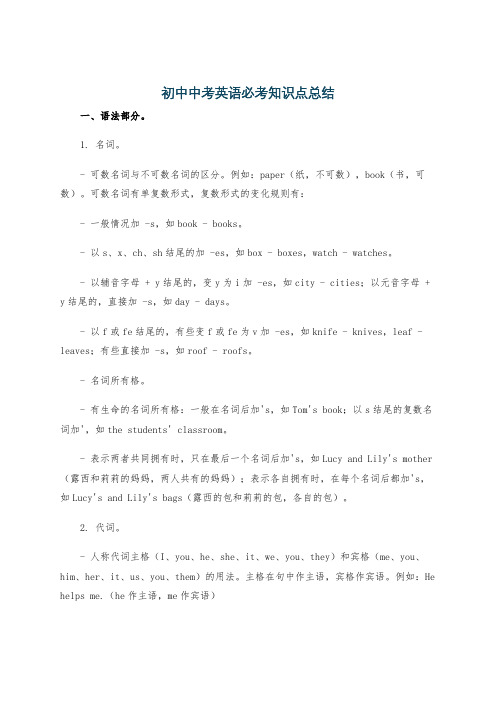
初中中考英语必考知识点总结一、语法部分。
1. 名词。
- 可数名词与不可数名词的区分。
例如:paper(纸,不可数),book(书,可数)。
可数名词有单复数形式,复数形式的变化规则有:- 一般情况加 -s,如book - books。
- 以s、x、ch、sh结尾的加 -es,如box - boxes,watch - watches。
- 以辅音字母 + y结尾的,变y为i加 -es,如city - cities;以元音字母 + y结尾的,直接加 -s,如day - days。
- 以f或fe结尾的,有些变f或fe为v加 -es,如knife - knives,leaf - leaves;有些直接加 -s,如roof - roofs。
- 名词所有格。
- 有生命的名词所有格:一般在名词后加's,如Tom's book;以s结尾的复数名词加',如the students' classroom。
- 表示两者共同拥有时,只在最后一个名词后加's,如Lucy and Lily's mother (露西和莉莉的妈妈,两人共有的妈妈);表示各自拥有时,在每个名词后都加's,如Lucy's and Lily's bags(露西的包和莉莉的包,各自的包)。
2. 代词。
- 人称代词主格(I、you、he、she、it、we、you、they)和宾格(me、you、him、her、it、us、you、them)的用法。
主格在句中作主语,宾格作宾语。
例如:He helps me.(he作主语,me作宾语)- 物主代词分为形容词性物主代词(my、your、his、her、its、our、your、their)和名词性物主代词(mine、yours、his、hers、its、ours、yours、theirs)。
形容词性物主代词后面要接名词,名词性物主代词相当于名词,可以单独使用。
中考英语动词考点归纳整理(共四大类)

中考英语动词考点一、考试中常出现的动词短语1.a bottle/glass/cup… of 一瓶/玻璃杯/茶杯......2.a few一些3.a kind of一种;一类4.a little一点;少量5.a lot of…= (lots of…)许多的......6.a moment later片刻之后7.a number of若干的;许多的8.a pair of一双;一副9.a piece of一块(张;片;只)10.all day(long)整天;一天到晚11.all kinds of各种各样的......12.all one’s life一生;终生13.all over到处;结束14.all over the world全世界15.all right行了;好吧;(病)好了16.all the same仍然17.all the time①一直;始终②老是(美国英语)18.arrive at/in到达某地19.as…as… 和......一样......20.as…as one can(=as…as possible)尽量......21.as soon as 一......就......22.at breakfast早餐时23.at first起先;开始的时候24.at home在家25.at last最后;终于26.at night在夜里27.at noon在正午28.at once立刻;马上29.at school在学校上课30.at the back of在……的后面31.at the head of在……的前面32.at the moment此刻33.at the same time同时34.at this time of (the)year在(一年中)这个时节里35.at times时常;有时36.at work在工作37.be able to do sth.(= can+V.) 能够38.be angry with sb.生某人的气be angry at/about sth.生某事的气39.be born出生40.be different from…和……不同41.be full of充满着……42.be good at善于be bad at 拙于43.be good for对……有益的be bad for对……有害的44.be in hospital生病住院be in the hospital在医院45.be late for迟到46.be like像......47.be made of (be made from)……制的;用…….制成的48.be/get ready准备好49.be sure肯定;确定50.break down①(机械)损坏②拆散(某物)51.by+交通工具搭乘某交通工具52.by the way顺便一提53.by then到那时54.catch (a) cold; have acold感冒55.change one’s mind改变想法(注意)e back回来e down下来e from①出生于②来自于e in进入;进来come out出来e over1过来;顺便来访e around(走)过来(绕行而来)62.day after day日复一日地;天天63.do +V.ing做某事64.do sport做运动;参加(体育)运动65.does well①做得很好②成功③成绩很好66.each other互相67.eat up吃完68.eith er…or…要么……要么......69.enjoy oneself过得愉快70.fall behind落后;跟不上71.fall off①跌落;掉下②(质或量)下降72.far away遥远73.feel like doing sth. 想要做某事74.feel tired感到疲劳75.find out查明;发现;了解76.from now on从今以后;今后77.from… to… 从……到……78.get back①返回②取回79.get down①下来;落下②记下来80.get dressed穿衣服;打扮81.get home到家82.get into①进入②搭乘(出租车)③陷入(坏的情况)83.get off ①下车②起飞84.get on①上车②生活85.get on (with…) = getalong (with…)①生活②与(某人)相处③(活动)有进展86.get out of①从......出来②从出租车(轿车)下来87.get ready to do sth.准备做某事88.get up①起床②起立89.get warm (long)变暖和(长)90.give...a call给……打电话91.give back归还;送回92.go back回去93.go for a walk散步94.go home回家95.go on继续96.go shopping去购物97.go to bed睡觉(并未入睡)98.go to school上学99.go to sleep入睡;睡着100.go to the cinema去看电影101.grow up成年;长大成人102.half an hour半小时103.have a drink of喝一点……104.have a good time玩得很高兴;过得愉快105.have a look (at)看一看106.have a match比赛have a test测验107.have a meeting开会108.have a rest休息109.have a swim游泳110.have a talk谈话111.have a walk散步112.have a wash洗(手,脸等)113.have breakfast吃早饭114.have lessons/classes上课115.have lunch吃午饭116.have sport进行体育活动117.have supper吃晚饭118.have to不得不;必须119.hear from + sb.收到某人的来信120.hear of听说121.help sb.with sth在某事上帮某人help sb.(to) do sth.帮助某人做某事122.hold a meeting(= have a meeting)举行会议123.hold on①等一等(别挂电话) ②坚持;继续124.hour after hour一小时又一小时地;持续地125.how long①(时间)多长;多长②(长度)多长126.how many/much2多少/多少(钱)127.how often多久一次128.how old几岁;多大(年纪)129.hundreds of数百130.hurry off匆匆离去;赶快去131.hurry up赶快132.in a minute一会儿;立刻133.in bed 躺在床上134.in English用英语(说)135.in front在前方(面)136.in front of 在......前面137.in time正好;及时138.in the middle of 在……中间139.jump into跳进……140.just a moment等一会儿141.just then正在那时142.keep busy(一直)忙碌st year去年ter on过后;以后ugh at嘲笑146.listen to 听……(讲话)147.look after照料;照顾148.look at(注视着)看;观看149.look for寻找150.look into 往……里看;调查151.look like看起来像152.look over(医生)检查153.look the same看起来一样154.lots of=a lot of许多;很多;大量155.make friends with与……交朋友156.make sure确保;证实157.middle school中学158.move away搬开;搬走159.move to搬到160.neither… nor…既不……也不161.never mind不要紧;没关系162.next time下次163.no longer=not…any longer不再164.not … at all一点也不;根本不(用来加强not的语气)165.not at all不用谢;别客气166.not so … as不像;不如167.on foot走路;步行168.on show展览;被陈列着169.on the earth在地球上170.on the (one’s) way在途中;在路上171.on time按时;准时172.out of在……之外;从……里头173.over there在那边;在对面174.Party member共产党员175.pass on传递176.pay for付钱;支付;付出代价177.play with玩耍178.post office邮局179.pull out of拉出,取出180.pull …up from把……从……拉上来181.put on穿;戴上;上演182.right away立刻;马上183.right now现在;刚刚184.send away撵走;开除;解雇185.send up发射186.sit down坐下187.so …that如此……以至于188.speak to sb.和某人说话189.spend some time on在……花时间190.stop sb.from doing sth.阻止某人做某事191.take a rest休息192.take a walk散步193.take away拿走194.take down取下195.take exercise锻炼(身体)196.take off脱掉衣物197.take one’s time①不急;慢慢干②用去(某人)3时间198.take part in参加199.take/have some medicine服药200.take the train/a boat/a bus…坐火车/船/公共汽车……201.talk about谈论202.talk to与……谈话203.teach oneself自学204.tell (sb.) about 告诉(某人)……205.the other(s)另一个(其他的)206.think about考虑207.too …to太……不能……208.try on试穿;试试看209.turn green变绿210.turn off关掉(自来水,电灯,收音机等)211.turn on开;旋开(电灯,无线电等)212.up and down上上下下;来回地213.very much很;非常214.wait for等候;等待215.wear out穿坏;穿旧;用尽216.with one’s help在(某人)帮助下217.work on①从事……工作②继续工作③研究218.worry about担心二、某些动词后接不定式和动名词的区别1.forget doing sth.忘记做过某事forget to do sth.忘记要做某事(未做)I forget to bring my homework.我忘记带作业了。
(word完整版)深圳市中考英语100个必考考点及题型答题技巧析

C. 连词
(1) 连词半边天现象:
Although ,though 与but 不连用
because 与 so 不连用
if (如果)与then 不连用
(2) 就近一致连词
neither...nor ,
either。..or ,
not only..。but also
not...but。。。
(2)have, has, had
will, would, shall, should 帮助表时态
(3)can, may, must, need 帮助表情态
行为动词like, cry,。等等(占99%)
行为动词的所有句型转换均需do家族三兄弟do、does或did帮忙
Be动词、助动词不需任何帮忙
I don’t have lunch at home. Neither do you.
much, a little, even, far
He is much taller than Tom。
比较级、最高级的不规则变化:
口诀:两病两多并两好,距离老远少迟到
bad/ill : worseworst
much/many : moremost
good/well : betterbest
Far(两种形式): farther farthest
双动词关系:
单句中,若有两个动词(be动词,行为动词,不包括助动词),他们的关系有四种:
and 连接—-动作先后或并列发生,前后形式一致
改为to do-—动作未做,准备做
改为doing--动作正在做或已做
改为—ed 形式——后一动作被动发生
特例:* 使、让(make ,let, have)
- 1、下载文档前请自行甄别文档内容的完整性,平台不提供额外的编辑、内容补充、找答案等附加服务。
- 2、"仅部分预览"的文档,不可在线预览部分如存在完整性等问题,可反馈申请退款(可完整预览的文档不适用该条件!)。
- 3、如文档侵犯您的权益,请联系客服反馈,我们会尽快为您处理(人工客服工作时间:9:00-18:30)。
历年英语中考考点归纳必考内容之一:被动语态考查形式:单项,完形,完成句子题型出现,尤其是完成句子。
考察难度:考查的动词都是比较简单、拼写不会超过5个字母的单词,过去分词一般都是直接+ed出现,出题不难,要求掌握被动语态的判断、被动语态的结构和动词过去分词的正确拼写。
要点归纳:1、结构:be+过去分词+(by+动作执行者)2、掌握的几种形式:一般现在时的被动语态:一般过去时的被动语态:现在完成时的被动语态:(理解要求)一般将来时的被动语态:含有情态动词的被动语态:3、感官动词或使役动词使用省略to的不定式,主动语态中不带to,但北纬被动语态时,须加上toFeel, hear, listen to, let, have, make, see, watch observe, notice, look at, help口诀:十二个动词真正怪To去to 归让人烦主动语态时不在被动语态却回来例:make sb do sth = sb +be+made + to do sth4、被动语态常考的固定搭配:Be made ofBe made fromBe made inBe used forBe used to do注意下列短语和动词有“被动形式”,但没有被动的意思:be used to doingUsed to do sthBe made up ofBe dressedBe well-known for5、无被动语态的不及物动词常考的有:happen, take place, begin, start, end, belong to,come true.6、含双宾语的被动语态:和to搭配的:give, show, pass, hand, tell, lend, bring ,ect.和for搭配的:buy, pay, sing, wake, get, do, ect.7、主动表被动的动词:sell, wash, write, 和五个起来:feel, smell, look, taste, sounde.g.: The pen writes well.He looks strong.8、用法引导:A.强调动作的承受者B.不知动作的执行者C.没有必要指出动作的执行人D. 下列句子要注意It is said that….It is known that….It is believed that….必考内容之二:宾语从句考查形式:单项、完成句子考察难度:考察全面,考查必须掌握引导词、时态和语序这三个要素。
要点归纳:1、陈述语序2、时态:主句为一般现在时,______________________________时态:主句为一般过去时,______________________________3、that, whether, if, what, who, which, whose, when, where ect.4、宾语从句的简化:但主句的主语和从句的主语为同一人时,从句可以简化为疑问词+不定式。
必考内容之三:状语从句考查形式:单项、完形、,完成句子,重点考查条件状语从句、目的壮语从句、时间状语从句、原因状语从句、结果状语从句,时间状语从句往往结合过去进行时考查,主长从短:I was sleeping when you came in. 主短从长:When he was watching TV, I ran in. 完形填空出现一般都是选择正确的引导词。
考查难度:考察较多的是引导词方面的,对于时态方面的考查较少。
考生复习时除了要掌握状语从句各个连词的意义,同时也需要掌握“主将从现”“主祈从现”“主情从现”的时态要求。
要点归纳1、时间状语从句:when & while 的运用_________________________________________________________注:while有“然而”的意思,表转折2、as soon as___________________________________________________3、not…until…._________________________________________________4、if & unless___________________________________________________5、so…that…___________________________________________________6、so that_________________________________________________________7、because______________________________________________________考查内容之四:定语从句考查形式:单选、完型考察难度:主要考查引导词的选择——关系代词that, which, who以及关系副词where, when。
要点归纳:1、that:人或物,人+物2、which:物3、who:人4、when & where:地点、时间记忆诀窍:从句完整则用when/where,不完整则用which、that,选项同时which & that,则一定不选which/that必考内容之五:感叹句考查形式:单词、完成句子考查难度:考查较简单,基本属于送分题。
考生须掌握how和what引导的感叹句的基本句型,并且熟悉一些常用形容词和副词的拼写。
要点归纳:1、what + a / an +adj. +单数名词(+ 主语+ 谓语)!2、What +adj. +复数名词(+主语+ 谓语)!3、What+adj. +不可数名词(+主语+谓语)!常考的几个不可数名词:food,news,weather,fun,music,work,information,advice,suggestion。
注意:what引导的感叹句,主语+谓语可以省略。
4、How + adj. +a / an + 单数名词(+主语+谓语)!5、How+adj./adv.+主语+谓语!6、How + 句子!必考内容之六:反意疑问句考查形式:单项选择考查难度:较简单,考生只需掌握该语法点的原则,一般都能做对。
要点归纳:1、原则:(1)前肯后否,前否后肯(2)前名后代(3)时态一致常考的否定词:never,few,little,hardly,no,seldom,nobody,nothing,none2、常考句型:含有have、has、had时若出现在完成时态中,则用________________提问否则,找助动词do/dose/did 帮忙They had to leave early to catch the train, _____ ______?He has few friends in the new school, _______ ________?Had better 用hadWe’d better stay at home todays, __________?There be …? ________ there?Let’s…, _______? Let us…, ______?祈使句,___________?3、反义疑问句的回答:根据实际答题。
4、注:有前后缀例外He is unhappy, isn’t he?They dislike me, don’t they?5、I think/believe +that 从句,反义疑问句应反从不反主:I think Tom has left, hasn’t he?I don’t believe you are right, are you?常考内容之七:动词考查形式:时态、情态动词、动词短语、分词做形容词、非谓语动词考查难度“动词是词法的核心,考查范围较大,难度较大一、时态要点归纳考点一:主将从现(在状语从句已经提到)考点二:现在完成时4大用法:结果,延续,经历,移位时间标志:for + 时间段、since+ 时间点/一般过去时的句子、already、yet、every、never、“How long…?”、含有“time”表示次数的句子中要点归纳:区分:have been to + 地点__________________________have gone to + 地点_________________________have been in + 地点+ for + 时间段__________________________瞬间动词与延续性动词间的转换:die – be dead buy—have borrow—keep leave/go—be away(from)make friends—be friends begin/start—be onarrive/get to/reach/come—be in/be at/stayjoin (the Party)—be a (Party) member /be in (the Party)核心句型:It is + 时间+since+一般过去时的句子考点三:过去进行时(在时间状语从句中考查)考点四:一般现在时(客观真理)、一般过去时(在宾语从句中考查)二、情态动词归纳情态动词有:must, have to, had better, can, could, be able to, may, might, need, will, would, shall, should + 动词原形考点一:must can 表示推测的运用考点二:mustn’t的运用,意思是_______________________________________________考点三:情态动词一般疑问句的回答Must ……? Yes, S + must. No, S +needn’tNeed…….? Yes, S + may No, S + musn’t三、非谓语动词归纳:和介词一样非常灵活,在句法中,不作谓语,所有句子成分都可充当。
只考查动词不定式、动名词作宾语To + do ( 否定式———not + to + do)1、只能接to +do的动词有:decide, agree, hope, want, refuse, plan, need, wish +to do2、有些动词加to do 做宾语补足语,常见的有:Ask, tell, want, teach + sb. +to do +sth.3、加to + do 的重点句型有:(1)It takes sb. Some time/money to do sth. 做某事花费某人多少时间、金钱(2)It is + adj. + for/of sb. to do sth. 做某事怎样(3)Would you like to….?4、后接省略to的动词不定式的动词有一感(feel)二听(hear, listen to)三让(have, make, let)五看(watch, ,see, look at, notice, observe),半个帮助(help可以带to,也可以省略)改为被动语态时,to要还原例如:This little boy is made to clean his bedroom every week.5、省略to的情况有(1)情态动词后(2)Why not/why don’t you(3)Would rather…than…Doing (否定式———not doing)1、加doing作非谓语动词常考的有:enjoy,mind,suggest,miss,admit,deny,imagine,practice+doing sth.2、加doing的情况有:(1)介词后+doing 例如:give up doing sth., be interested in doing sth.等(2)Feel lilke + doing (喜欢做某事)/prefer doing sth. to doing sth.(更喜欢…..)(3)To作介词时的几个常用短语:look forward to/be used to/pay attention to + doing3、既可加to do 也可加doing,并意思相近的动词有:begin, start, like, love, hate4、既可加to do 也可加doing,但意思不同的动词有:Forget to do 忘记去做某事(事情还没有做)Forget doing 忘记做过某事(事情已经做了,但是忘了)Remember to do 记得去做某事(事情还没有做)Remember doing 记得做过某事(事情已经做了)Regret to do (对将要做的事)遗憾Regret doing (对已经做过的事)遗憾Stop to do 停下来去做某事(去另外一件事情)Stop doing 停止做某事(停止正在做的事情)归纳记忆:stop…from + doing = prevent… from doingTry to do 尽力做某事(区分:manage to do 设法做某事)Try doing 尝试去做某事Keep/go on to do 继续去做某事(停止原来做的事情而继续另一件事情)Keep/go on doing 继续做同一件事情Mean to do = plan to do 打算/计划去做某事Mean doing 意味着做某事重点区分下列搭配:See / watch sb. do sth. 看到、看着某人做某事(已做了)See / watch sb. doing sth. 看到、看着某人正在做某事(在做)Hear / notice sb. do sth. 听到/注意到某人做某事(已做了)Hear / notice sb. doing sth. 听到/注意到某人正在做某事(在做)关注:have sth. done/ get sth. done need doing / want doing四、动词短语近年广州中考高频动词短语归纳动词和动词短语在广州市中考里面主要是考察词义辨析,是历年中考的必考内容。
